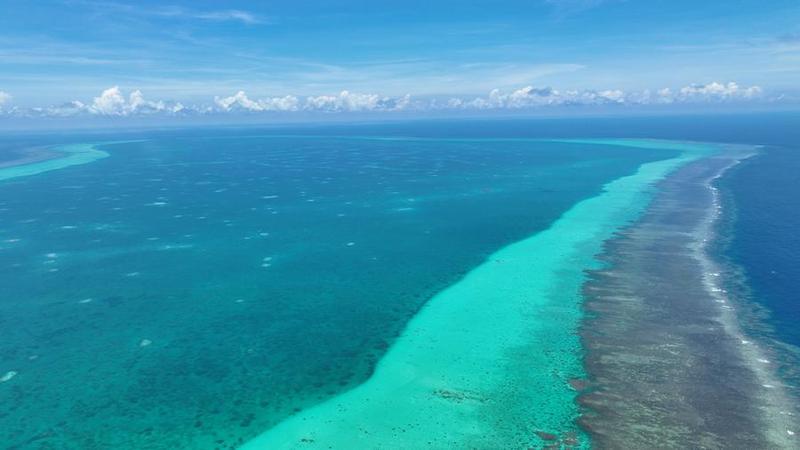Nov 10, 2024, 18:52

A view of China's Huangyan Island. [Photo/Xinhua]
Global Times-The Philippines has consistently sought to make waves regarding the South China Sea issue. The two-week combat drills initiated by the Philippine military on Monday, which include exercises aim at seizing an island in the South China Sea, are currently ongoing. On Tuesday, the Philippines' Defense Secretary Gilberto Teodoro claimed at a security forum in Manila that he would prefer ASEAN to recognize that China was "overstepping" in the South China Sea, noting that "getting some principles or some reactions regarding the expansive activities" in the South China Sea is a "good first step" for ASEAN. It's evident that The Philippines has attempted to "hijack" ASEAN for its own interests, sparing no effort to portray the South China Sea issue as a problem between China and ASEAN.
On one hand, Manila seeks to gain sympathy from ASEAN countries and the international community. On the other hand, it hopes that ASEAN nations, especially other South China Sea claimants, could form a "united front" against China. However, inflammatory political remarks, failed maritime provocations and close ties with the US will only put the Philippines in an awkward position among ASEAN member states.
The South China Sea issue does not hinder relations between China and ASEAN, nor does it affect the relationships between China and most South China Sea claimants in ASEAN. If a country fixates on the South China Sea and panders to external powers, it is clearly using sovereignty as a pretext while neglecting its own long-term interests. Many South China Sea claimants in ASEAN have maintained good relations with China and have managed this issue approximately. Malaysia serves as a typical example.
Unlike Manila's aggressive approach on the South China Sea issue, Malaysia's stance is much more moderate and pragmatic. As Malaysian Prime Minister Anwar Ibrahim recently stated in an interview, "China and Malaysia have problems as most countries have problems with their neighbors, but these problems do not in any way affect our strong bond, friendship and cooperation." Malaysia's position in addressing the South China Sea issue is based on dialogue and negotiation, rather than catering to external powers, or flexing military muscles.
China and ASEAN as a whole have always shared the same expectations for peace and stability in the region. The situation in the South China Sea has been generally under control for years, which is the result of the joint efforts of China and ASEAN countries.
China's consistent position on the South China Sea issue is that disputes should be settled peacefully through negotiation and consultation, and managed through rules, norms and operating mechanisms. Its primary concern is to maintain peace and stability in the South China Sea, which is also in the common interest of China and ASEAN countries.
ASEAN has maintained a prudent stance on regional security issues. Li Kaisheng, vice president of the Shanghai Institutes for International Studies, believes that once conflicts arise due to the South China Sea issue, Southeast Asian countries will suffer the most. Therefore, many of them have recognized the consequences of smaller countries picking sides and are unwilling to serve as proxies of any external powers.
ASEAN countries have a clear view of the Philippines' intentions. Regarding the actions of the Philippines on the South China Sea issue, no other ASEAN member state has provided the kind of "response" that Manila expected. Most ASEAN countries believe that these actions will only escalate confrontational sentiments, exacerbate maritime friction, and further complicate the regional situation, which in turn heightens ASEAN's concerns and objectively undermines the unity of ASEAN.
Not long ago, ASEAN called for a swift agreement on a code of conduct for the South China Sea. It's a signal that China and ASEAN insist on solving the South China Sea issue through political means regardless of Manila's provocations, and the attempts of some countries outside the region to fan the flames will become eventually futile.
Indeed, everyone is aware of it. However, they're also aware that it's a international crime to kill civilian women and their children.
But Uncle Sam and his guardian from Israel are above ANY international laws governed by the UNITED NATIONS.
Certainly, i
Everyone knows the S. China Sea is China's territorial waters. This is nothing more than an Anglo/Jew gangster provocation because as useless, genocidal parasites, they have nothing to bring to the table so resort to extortion.
Incidentally, if they want to cite the 200 nautical mile EEZ of UNCLOS, then that also automatically means Taiwan is part of China. But then it also means the entire eurasian continent is also part of China. This is how puerile and malignant the Anglo and the Jew are.
Community login







Add a comment